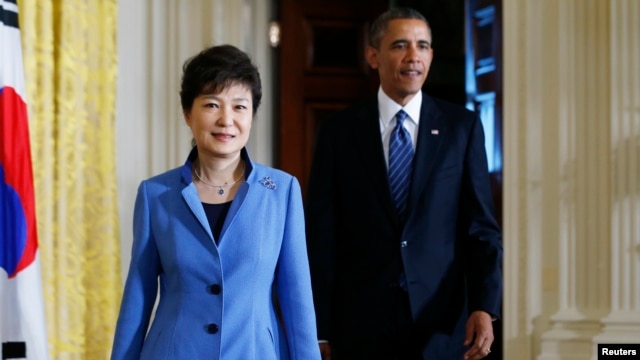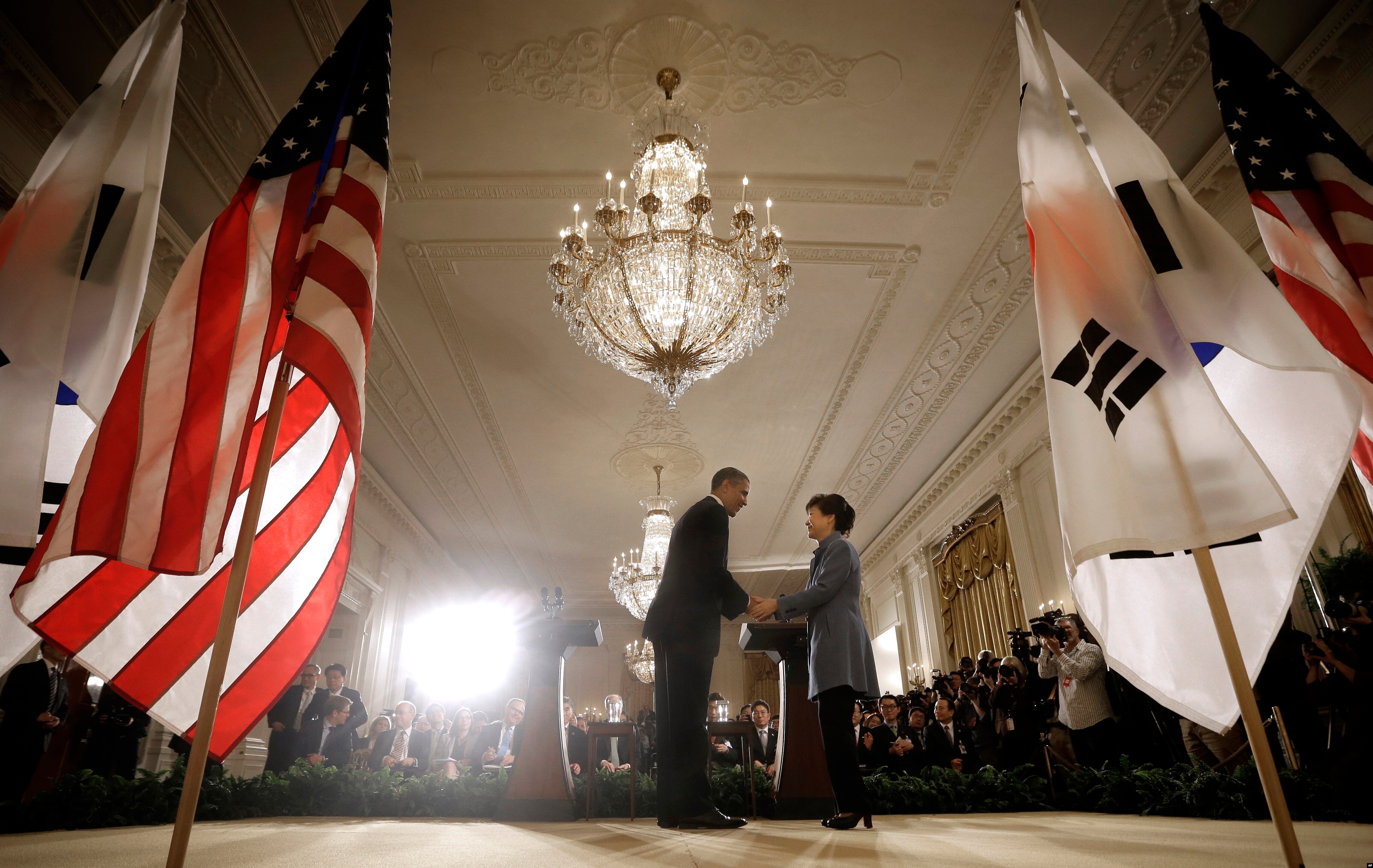U.S. President Barack Obama and South Korea's President Park Geun-hye arrive for a joint news conference in the East Room of the White House in Washington, May 7, 2013.
South Korean President Park Geun-hye addresses a joint meeting of the U.S. Congress Wednesday, as she continues a tour of Washington that has been dominated by talks on North Korea.
After meeting with President Barack Obama at the White House Tuesday, Park said Seoul and Washington must not tolerate North Korea's recent wave of threats.
"With regard to North Korea's bad behavior and its provocations, the international community must speak with one voice," she said, "and consistently send a firm message that they will not stand for it and that North Korea's actions are in breach of international norms."
Obama said the U.S. is ready to engage diplomatically with the North if it decides to embrace a "peaceful path," but stressed that Pyongyang's bad behavior will not be rewarded.
He said the days when North Korea could create a crisis and elicit concessions are "over," calling the U.S. and South Korea "as united as ever" and North Korea "more isolated than ever."
"If Pyongyang thought its recent threats would drive a wedge between South Korea and the United States, or somehow garner the North international respect, today is further evidence that North Korea has failed again," he said.
White House officials said the meeting between the two leaders was meant to reaffirm the United States' commitment to the defense of South Korea. Obama said he and Park also agreed to continue the implementation of the two nations' historic trade agreement and clean energy partnerships.
President Park is in the U.S. for a five-day visit, which she began Monday at the United Nations in New York. The South Korean leader, who is heading a delegation of more than 50 South Korean business leaders, will stop in Los Angeles Thursday to meet with Korean entrepreneurs.
The trip is meant to send a strong message of unity to the North, which has gradually reduced the intensity of its war rhetoric, following weeks of threats of nuclear and conventional attacks against the U.S. and South Korea.
Earlier this week, U.S. officials said they believe North Korea has removed two mid-range missiles from imminent-launch status, in an apparent further easing of tensions.
Washington had for weeks warned North Korea could launch the untested Musudan missiles, which have a range of up to 3,500 kilometers and could reach several U.S. targets in the region.
Pyongyang has been upset at United Nations sanctions that were expanded in response to its latest nuclear test. It also responded angrily to annual joint military exercises between the U.S. and South Korea.
After meeting with President Barack Obama at the White House Tuesday, Park said Seoul and Washington must not tolerate North Korea's recent wave of threats.
"With regard to North Korea's bad behavior and its provocations, the international community must speak with one voice," she said, "and consistently send a firm message that they will not stand for it and that North Korea's actions are in breach of international norms."
Obama said the U.S. is ready to engage diplomatically with the North if it decides to embrace a "peaceful path," but stressed that Pyongyang's bad behavior will not be rewarded.
He said the days when North Korea could create a crisis and elicit concessions are "over," calling the U.S. and South Korea "as united as ever" and North Korea "more isolated than ever."
"If Pyongyang thought its recent threats would drive a wedge between South Korea and the United States, or somehow garner the North international respect, today is further evidence that North Korea has failed again," he said.
White House officials said the meeting between the two leaders was meant to reaffirm the United States' commitment to the defense of South Korea. Obama said he and Park also agreed to continue the implementation of the two nations' historic trade agreement and clean energy partnerships.
President Park is in the U.S. for a five-day visit, which she began Monday at the United Nations in New York. The South Korean leader, who is heading a delegation of more than 50 South Korean business leaders, will stop in Los Angeles Thursday to meet with Korean entrepreneurs.
The trip is meant to send a strong message of unity to the North, which has gradually reduced the intensity of its war rhetoric, following weeks of threats of nuclear and conventional attacks against the U.S. and South Korea.
Earlier this week, U.S. officials said they believe North Korea has removed two mid-range missiles from imminent-launch status, in an apparent further easing of tensions.
Washington had for weeks warned North Korea could launch the untested Musudan missiles, which have a range of up to 3,500 kilometers and could reach several U.S. targets in the region.
Pyongyang has been upset at United Nations sanctions that were expanded in response to its latest nuclear test. It also responded angrily to annual joint military exercises between the U.S. and South Korea.



没有评论:
发表评论